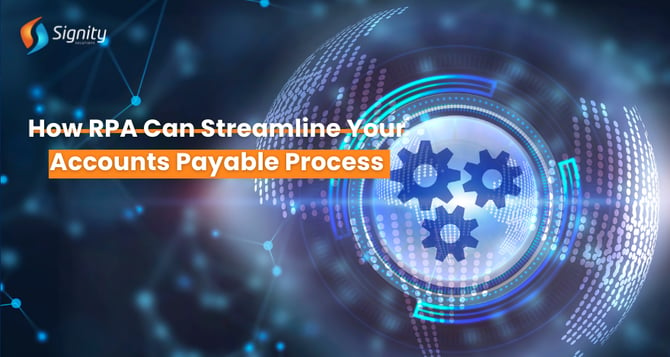10 Ways RPA Can Streamline Your Accounts Payable Process
Discover how RPA has been transforming processes in the accounts payable department by streamlining processes like invoice processing and three-way matching. This blog also highlights why manual accounts payable is no longer a feasible option and how RPA services benefitted the startup Skillshare.

Is your accounts payable giving you a headache with high error rates, poor visibility, inadequate analytics, and prolonged dispute resolutions?
Then, we have a solution for you- RPA (Robotic Process Automation).
Nowadays, RPA in accounts payable is revolutionizing the industry. It helps automate processes, aids in invoice and payment processing automation, and facilitates vendor management.
According to a report by Ardent Partners, 49% of accounts payable teams in 2024 still need to work on time-consuming invoice processes.
This blog will give you a clear picture of how RPA is helping accounts payable teams across the globe.
Let’s get started!
Key Takeaways:
- Manual accounts payable pose many challenges, such as error rates, slow data processing, and payment errors.
- Adding RPA to accounts payable offers benefits like increased compliance standards adherence, enhanced vendor relationships, and automated data entries.
- Last year, Skillshare's online learning platform implemented RPA in its accounts payable systems, facilitating payments to creators overseas.
What Is The Need For RPA In Accounts Payable?
Firstly, what is the meaning of “automation” in accounts payable? When certain technologies are implemented in the accounts payable industry to automate rule-based, repetitive tasks, they improve the overall productivity of the AP process. Also, RPA in accounts payable enforces internal controls. This feature helps improve overall quality standards and ensures compliance with regulatory guidelines.
Accounts payable automation using RPA takes care of mundane tasks in the organization. It frees up time for the employees and allows them to focus on more cerebral tasks, like financial analysis. By implementing RPA in the processes, the accounts payable industry can save a lot of costs, aim for process optimization, and expect more transparency in its operations.
First, let us see in detail the challenges of manual accounts payable processing. According to Deloitte, 56% of global organizations have already implemented RPA and automation in various departments.
According to Deloitte, 56% of global organizations have already implemented RPA and automation in various departments.
What Are The Challenges In Manual Accounts Payable Processing?
Manual accounts payable processing poses several risks, such as countless errors, inconsistencies, and issues adhering to compliance requirements. The cost per invoice processed is high due to errors and delays, which negatively impact vendor relationships and payment timelines. All these challenges can significantly hinder business agility, transparency, and effectiveness.
Let us have a look:
1.) Increased Error Rates
Even a small error in the financial system is a blunder. It can lead to delayed payments and strained vendor relationships. Errors in manual accounts payable can be caused by a variety of factors, such as a typing mistake, a missed word or syllable, or a simple misinterpretation of the data.
Errors in accounts payable can make financial reporting difficult and make compliance with compliance regulations difficult. This step requires a keen and constant eye for detail, which is very difficult for humans.
2.) Slow Processing
If there’s slow processing in the system, it can create differences between the vendor and the supplier. A lot of systematic approaches are present in this step.
Due to the slow processing of data, it becomes very difficult to forecast liquidity. The slow processing of data leads to very late payments to the suppliers, which might cause the company to face a cash deficit in the upcoming years. If there’s a slow processing of data due to payment obstacles, suppliers will lose trust in the organization.
3.) Payment Errors
The organization’s credibility always depends on the accuracy of the data it generates. In manual accounts payable processes, there might be several errors, such as faulty payment accounts, payments to the wrong vendors, or even duplicate payments. Resolving these errors can be very expensive and take up a lot of time.
Some of the things that might happen as a result of these risks are financial losses, loss of resources, and strained relationships with the vendors. Some errors can also have legal repercussions.
4.) Insufficient Vendor Management
Improper vendor management poses many financial risks for the company. Overpayments and duplicate payments will occur, operations will be disrupted, and the supply of goods will be delayed.
Insufficient vendor management can have legal implications, too.
5.) Compliance Challenges
When financial transactions are handled manually, there are many discrepancies. If there are inaccuracies in economic standards, the documents do not adhere to accounting standards like GAAP or IFRS. There is a lot of delay in invoice processing and payments. If this does not comply with the payment terms agreed to between vendors, it might have serious repercussions.
Manual accounts payable processes are also dependent on paper-based documentation, which is prone to loss and damage. Ensuring compliance with VAT/GST requirements, withholding taxes, and reporting obligations requires accurate and timely processing of invoices and payments For those handling taxes, understanding how to calculate withholding tax is essential.
At Signity, we have cutting-edge RPA solutions for the above issues in accounts payable. Let's examine how RPA solves the problems.
The 10 Ways in Which Accounts Payable Automation Using RPA Helps
RPA offers countless benefits that streamline AP processes, improve overall accuracy, and enhance relationships with vendors. Here, we explore the top advantages of integrating RPA into accounts payable workflows and learn in detail how organizations can achieve greater productivity.
1.) Automated Data Entry
RPA in the accounts payable industry helps automate mundane tasks. This is one of the top use cases of AI and RPA in the accounts Payable departments. It eliminates manual data entry, which leads to many errors. The RPA entails systems that capture data from financial documents like invoices and purchase orders. There is minimal need for human intervention. Processing time increases manifold, decreasing operational costs and increasing compliance quality.
Since the robots work on rule-based automated tasks, the other teams have ample time to focus on the core areas of the job.
2.) Invoice Processing Automation
Robotic process automation accounts payable analyses data from invoices, such as vendor mail and invoice numbers. From receipt of the invoice to payment, RPA helps automate each step. RPA bots can automatically scan, classify, and extract relevant data such as invoice numbers, dates, line items, and amounts using Optical Character Recognition (OCR) technology.
There is a set of pre-defined rules against which RPA tallies the invoice data. RPA In invoice processing improves the overall accuracy and mitigates errors. However, using a free invoice generator can help streamline entire workflows and accelerate the overall process. It helps in optimizing cash-flow management, as well.
3.) Purchase Order Matching
Robotic process automation accounts payable helps automate purchase order matching in invoice processing using advanced technologies and algorithms. Using OCR (Optical Character Recognition) technology, RPA extracts data from purchase orders. There is ‘automatic matching, ' wherein the RPA tallies the extracted data against pre-set rules.
Transaction records are updated in real-time as RPA in accounts payable integrates seamlessly with ERP (Enterprise Resource Planning). This step ensures that the financial data extracted is uniform across all departments of the organization.
4.) Payment Processing
One major area in which robotic process automation accounts payable tallies data against established rules. During the matching process, RPA bots can flag and mitigate potential issues like quantity variations.
RPAs can seamlessly integrate with baking platforms and ERP systems. Once the payments are verified, bots can produce detailed invoice data. This highly reduces any risk of discrepancies and increases compliance with payment guidelines.
5. Vendor Management
RPA in accounts payable helps in vendor management in the following ways:
-
Vendor Onboarding
- RPA implementation helps collect, analyze, and verify the onboard details before onboarding. RPA bots can perform compliance checks, too. One example includes W9 forms.
-
Payment Reminders
- RPA bots help send payment reminders and important updates to vendors. Overdue payments or any discrepancy can be communicated to the vendor very effectively using RPA bots.
-
Vendor Monitoring
- Certain critical features of a vendor, like delivery time, customer behavior, and quality ratings, are crucial. After collecting all the information, RPA bots can provide intuitive dashboards.
-
Compliance Requirements
- Robotic process automation accounts payable help manage the documents for vendor contracts. When it comes to compliance, RPA bots take stock of milestones, ensure that the system adheres to compliance standards, and automate the entire reporting process.
6.) Compliance and Audit Trail
If you look at the ways in which RPA benefits the mortgage industry, compliance is at the top of the list. Similarly, in the accounts payable industry, RPA services automate everything, from the data entry process to invoice processing to payment verification. This reduces errors and improves system accuracy. The audit trails generated with the help of RPA are very detailed. They contain every step in great detail, leading to seamless audit checks.
Moreover, RPA helps in tallying information against internal policies and detecting discrepancies beforehand. This ensures adherence to deadlines and timely payments. In vendor management, RPA also ensures proper communication and that the vendor is complying with the contractual agreement. Overall, this ensures transparency in the entire mechanism.
7.) Reporting and Analytics
Firstly, RPA helps aggregate data from various sources. This data can include invoices, purchase orders, and vendor details. RPA constantly monitors and updates details about transactions.
RPA presents dashboards that are easy for the audience to analyze. For the financial stakeholders, RPA presents intuitive dashboards that are very readable. When it comes to audit trails, RPA enables the automation of the same.
RPA ensures compliance with regulatory requirements and audit standards by automating the generation of audit trails, compliance reports, and documentation.
8.) Fraud Detection
In accounts payable, RPA constantly monitors transactions and invoices. RPA bots can detect anomalies in the system, like duplicate payments or suspicious vendor accounts. There are predefined rules and previously generated data from which RPA software can tally data and report suspicious transactions.
RPA can enforce segregation of duties by ensuring that no single user has unchecked control over the system. Automated workflows can streamline audits and investigations by providing auditors with detailed, real-time data and audit trails. Hence, the implementation of RPA in accounts payable improves the overall accuracy of the system.
9.) Dispute Resolution
RPA bots in accounts payable can extract data from various sources, such as purchase orders and communications with vendors. If you have to resolve a dispute, it is very important to identify the root cause. When the staff has access to the entire repository, the dispute-resolution process is facilitated.
In addition to this, RPA also helps improve transparency in the dispute resolution process. RPA maintains a detailed audit trail of all communication related to dispute resolution. The stakeholders have a clear idea of the resolution process, which bolsters the transparency of the entire process.
10.) Automatic Reconcilataion
Automatic reconciliation is a cornerstone of accounts payable automation, and RPA excels in this domain. RPA bots can perform automatic reconciliation by comparing data across different systems, such as matching invoice details with bank account records. This process ensures that all transactions are accurately recorded, reducing errors and discrepancies.
RPA also provides real-time reconciliation reports, allowing for prompt resolution of any issues. By integrating seamlessly with ERP systems, RPA ensures that the financial data is consistent and reliable, enhancing the overall accuracy and integrity of the accounts payable process.
RPA Tools and Technologies
A variety of RPA tools and technologies are available to support accounts payable automation, each offering unique benefits:
-
Optical Character Recognition (OCR): OCR software can extract data from paper invoices and other documents, converting them into digital formats that RPA bots can process.
-
Enterprise Resource Planning (ERP) Systems: ERP systems can integrate with RPA software to automate financial processes, ensuring seamless data flow and consistency across the organization.
-
Cloud-Based RPA Platforms: These platforms offer scalability and flexibility, allowing businesses to adapt their accounts payable automation as their needs evolve.
-
Machine Learning Algorithms: Machine learning can enhance the accuracy and efficiency of RPA processes over time by learning from historical data and improving decision-making capabilities.
These tools and technologies collectively help businesses streamline their accounts payable processes, reducing manual tasks and improving overall efficiency. By leveraging these advanced solutions, organizations can achieve greater accuracy, compliance, and operational excellence in their financial operations.
Signity's Success Story- Telecloud Case Study
TeleCloud, with over 40 years of expertise, specializes in seamless voice communication solutions tailored for businesses. From white-glove installation of IP phone hardware to round-the-clock support ensuring minimal downtime, Telecloud is a major player in society today. Their strength lies in effective customer service with a personal touch.
Challenge With Project
Manpower issues
The accounting department at TeleCloud spent approximately 1200+ hours per month on manual accounting processes, which created many inefficiencies.
Scalability
As TeleCloud's portfolio and operations grew, the volume of daily purchase order requests and vendor invoices increased significantly, straining existing manual processing capabilities.
-
Operational Inefficiency
Manual accounting processes resulted in many errors. Even a small error in financial accounting can have serious repercussions.
-
Employee Satisfaction
Employees were very dissatisfied with the lengthy and inefficient accounts payable processes.
Our Solution at Signity -
-
Problem Identification
-
Customized RPA Deployment
-
Expertise in RPA
Result after Implementing RPA -
After the adoption of an automated RPA-based accounts payable system, the operational efficiency of Telecloud increased in the following ways:
-
Increased Efficiency
We know by now how RPA automates the entire payment processing cycle. Processing time was reduced from hours to minutes.
-
Tax Compliance and Reconciliation
RPA helps track payments against invoices for accurate tax calculations. It also helps to generate and send monthly compliance reports automatically.
-
Improved Vendor Relations
Prompt payments enhanced relationships with influencers, contributing to broader brand reach and user acquisition. Errors in the payment process were reduced, and the process became more reliable.
-
Enhanced Financial Controls
Telecloud's security is enhanced because RPA automates its financial processes. Adherence to compliance standards becomes easy.
-
Scalability
Telecloud positioned itself for future growth by leveraging automation capabilities to handle increasing transaction volumes and operational complexities.
Every firm aims for a sustainable automated system that makes its operations easier. A reliable accounts payable system allows employees to focus on more strategic objectives.
Now, let us look at how dynamic RPA services at Signity can help your firm!
How Can Signity Assist You?
The best way to implement RPA in accounts payable is to contact a firm like Signity. Signity's RPA-led solutions integrate with your financial operations, ongoing applications, and workflows.
Using Signity’s RPA-led solutions, you can get the following benefits :
- Enhanced business agility
- Reduction in efforts and time
- Touchless invoicing process
- Automated Accounts Payable Process
- 90% improvement in compliance
- Enhanced customer support
- 99% improved Process Speed
 From choosing the correct platform to the bot daily initiation phase and ultimately to the three-way match by the bots, Signity’s team of experienced developers will guide you through every step.
From choosing the correct platform to the bot daily initiation phase and ultimately to the three-way match by the bots, Signity’s team of experienced developers will guide you through every step.

.png?width=1200&height=250&name=RPA%20-CTA%20(1).png)












